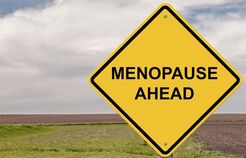 A few months ago I noticed a dragging sensation in my pelvis while out running. On the first occasion, I didn't take action, but when it happened again a week later I hot-footed it to a women's health physiotherapist to get it checked out. "Loss of strength in the pelvic floor," she said, "is typical of women in the perimenopause." I nodded as if this information was no surprise to me, while the news that THE CHANGE was upon me blared inside my head like a klaxon. Perimenopause is the stage of a woman's life, typically in her 40s or sometimes earlier, when declining oestrogen levels signal the transition towards menopause. The shortening of my menstrual cycle and the lengthening of each period had come on so gradually that it had barely registered. Disrupted sleep and anxiety are no surprise in 2020, and with the weather this summer it hasn't been until the last couple of weeks that it's become clear that the heat that sometimes wakes me overnight is coming from within me. In spite of my determination to be perennially in my prime à la Miss Jean Brodie, I have to accept that I may be reaching middle age. So, what to do if you are perimenopausal or menopausal? All of the usual advice about healthy living applies even more during this stage of life. Declining oestrogen contributes to increased cholesterol, reduced bone density, reduced muscle mass and it affects the way your body responds to insulin. Therefore a healthy diet and exercise are crucial at creating resilience in your body to prepare for the changes to come. Exercise can also help to manage mood and brain performance, which also frequently suffer during the perimenopause and menopause. However, even with the best diet and exercise programme, it isn't always possible to coast through the menopause, so don't suffer in silence. Contact your doctor, particularly if you are experiencing unexpected, extreme or ongoing symptoms. The NHS offers more advice and I found this interview about the 34 (yes, 34!) symptoms of the menopause to be quite helpful. October is World Menopause Month, with the 18th being World Menopause Day, so look out for information in the press. Lastly, if you are having any problems with stress incontinence, your first port of call should be your GP or a women's health physiotherapist rather than the Tena-lady aisle! While advertising campaigns referring to "Oops moments" have been great in destigmatising the problem, it is important to remember that loss of bladder control is common, but it is not a normal part of healthy ageing. If your pelvic floor isn't supporting your bladder, it won't be supporting your back properly either, so your whole body will thank you for taking care of it! Comments are closed.
|
AuthorFitness and Pilates instructor with a passion for science. Archives
November 2021
Categories |
 RSS Feed
RSS Feed
